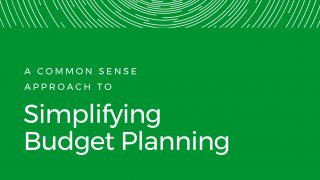- August 12, 2019
- CINC Systems

As a homeowner association (HOA) manager, you may be called upon to assist with developing the association’s annual budget. Providing historical data, anticipating future costs and pointing-out upcoming needs are valuable parts of your job; but it is the board that determines the numbers. In many ways, you’re the “eyes and ears” of the board when it comes to money management. You collect resident fees, pay invoices, monitor financial accounts, and perform other financial duties. This places you in a unique position to offer guidance about budgeting.
If your client’s HOA board approaches you for help setting an annual budget, use your knowledge of the association’s financial picture to inform them. You can provide custom financial reports from your HOA accounting software, like CINC Systems. Plus, your overall experience with HOA bookkeeping can also serve your clients in setting budgets.
An HOA’s annual budget will determine how much the association spends on services for its community, from common area maintenance to amenities. This also sets the amount residents pay in fees. A solid budget will account for all the HOA’s expenses, hopefully without exorbitant increases in fees. If your clients ask you to help plan the association’s annual budget, as a manager you can encourage the board to consider the following things.
Previous Annual Budgets Auditing
When creating an annual budget for an HOA, the best place to start is with an internal audit of previous years’ budgets. What is the association’s overall financial health? Has the HOA been in good financial standing, or have there been recent incidents with budgetary problems? How are the association’s reserve accounts looking? Are there large maintenance issues that require additional capital outlays to correct?
As an HOA manager, you can review past budgets with your client and help the board understand how its leadership has affected the community. Many financial experts recommend an audit that includes a minimum of three years’ financial activity. By seeing how well the HOA has been able to meet its budgetary goals, you can help the board decide what changes are necessary for the coming year.
Create a Baseline for Utilities and Maintenance Costs
In addition to utility services such as gas, electric, and waste disposal, what are the association’s other maintenance costs? Does the HOA employ security, a cleaning crew, or landscapers? If so, how much do these services cost each month?
After calculating monthly expenses for utilities and maintenance, you and your client can see the minimum amount required for the HOA’s annual budget. By assisting your client’s board members in understanding these expenses, you will be able to help them decide which services to expand or cut, if necessary.
Review Contracts with Vendors and Service Providers
Once you have assisted the HOA’s leadership by creating an inventory of monthly expenses, you can help them review contracts with outside parties that provide these services. This gives you and your clients an opportunity to renegotiate with vendors or hire new ones.
You can also help make sure that the HOA is receiving the best value for contract services. Aside from discussing the financial side of contracts, you can encourage your clients’ board members to poll residents and find out if the community is satisfied with its vendor’s services. Even if a vendor has low prices, it may be time to change if their services aren’t living up to the HOA’s standards.
Assist Association Board Members with Insurance Requirements
Annual budgeting sessions are the perfect time to review the association’s coverage and help your clients make sure they have adequate coverage. Requirements will vary from state to state, or even city to city. HOAs may also be required to carry more liability insurance if they have common recreation spaces, such as a pool or gym.
As an HOA manager, you can help your clients by researching the type of insurance they need and making recommendations. You can also make sure they’re getting the best value for your clients’ money. If needed, you can also help the board find an insurance agent.
Account for the HOA’s Reserve Fund
It’s important to have an adequate reserve fund in any annual budget. When you’re helping your clients create an annual budget for their HOA, you should advise the board to always account for its reserve fund. A portion of resident fees should always go into the reserve fund, even when it’s full. When managing HOA accounts, you help your clients by providing financial reports for the reserve fund from previous years.
Clear Up Outstanding Payments
As anyone who has ever managed an organization will know, planning an annual budget isn’t always a smooth process. It’s rare to have a clean starting point. Setting a budget for the new year will need to take into consideration many financial items that roll over from the previous year.
If you’re helping a client’s HOA plan its annual budget, make sure their board considers any outstanding payments from the previous fiscal year. If the association owes money for big projects, such as expansions or repairs, these payments will need to be included in the new annual budget.
Re-Determine Resident Fees
Lastly, help the HOA board consider resident fees when planning their annual budget. You can assist your clients with this after tallying all the association’s expenses, from monthly maintenance costs to big projects and any outstanding debts.
In general, there’s a simple formula for determining resident fees. First, add the total cost of operating the HOA to the reserve fund contributions. Divide this number by the total number of residents. The final number will be the amount that each resident pays annually. (Some associations may wish to divide this into monthly or quarterly installments.)
Once the HOA board has set its resident fees, you can use association management accounting software like CINC Systems to create an online payment portal. This will allow residents to set up automatic payments online.
Use HOA Accounting Software to Help
When you’re helping your clients plan an annual budget, there are several things an HOA board should consider. Luckily, HOA accounting software can help. The right accounting software can generate financial reports for custom data sets, including specific dates and categories. When you share these reports with your clients, the HOA board can make informed decisions about its new budget.
To see how HOA accounting software can help you serve your clients, try CINC Systems. Call (855) 943-8246, or request a free demo today.
Related Reads

Blog
Keeping Calm and Carrying On: Leadership Tips for Turbulent Times
- November 20, 2024

Blog
AI at Bat: What Umpires, Baseball, and Data Security Can Teach Us About AI Risks
- October 28, 2024

Blog
Do I really need a homeowner app when I have a mobile-friendly website?
- October 14, 2024

Blog
Weathering the Storm: How to Adapt to Soaring HOA Insurance Costs
- October 1, 2024

Blog
How Today’s Generative AI Investment Drives Long-Term CAM Success: A Timeline
- September 16, 2024

Blog
A Common Sense Approach to Simplifying Budget Planning Get ready to conquer HOA budget season with this effective strategy
- September 2, 2024
